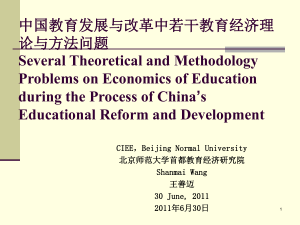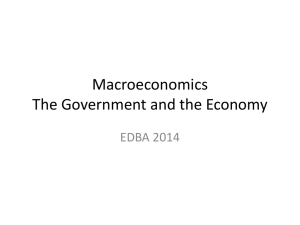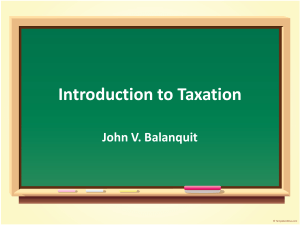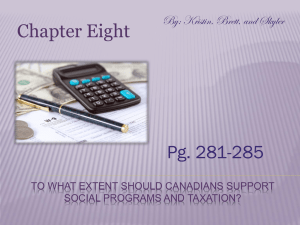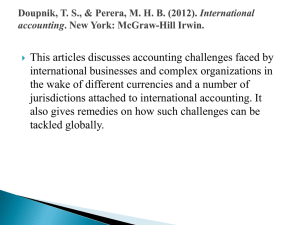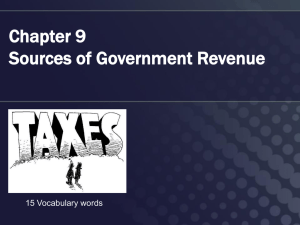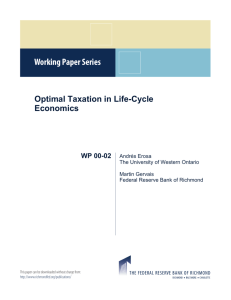Taxation on the threshold of Modern Times :
advertisement
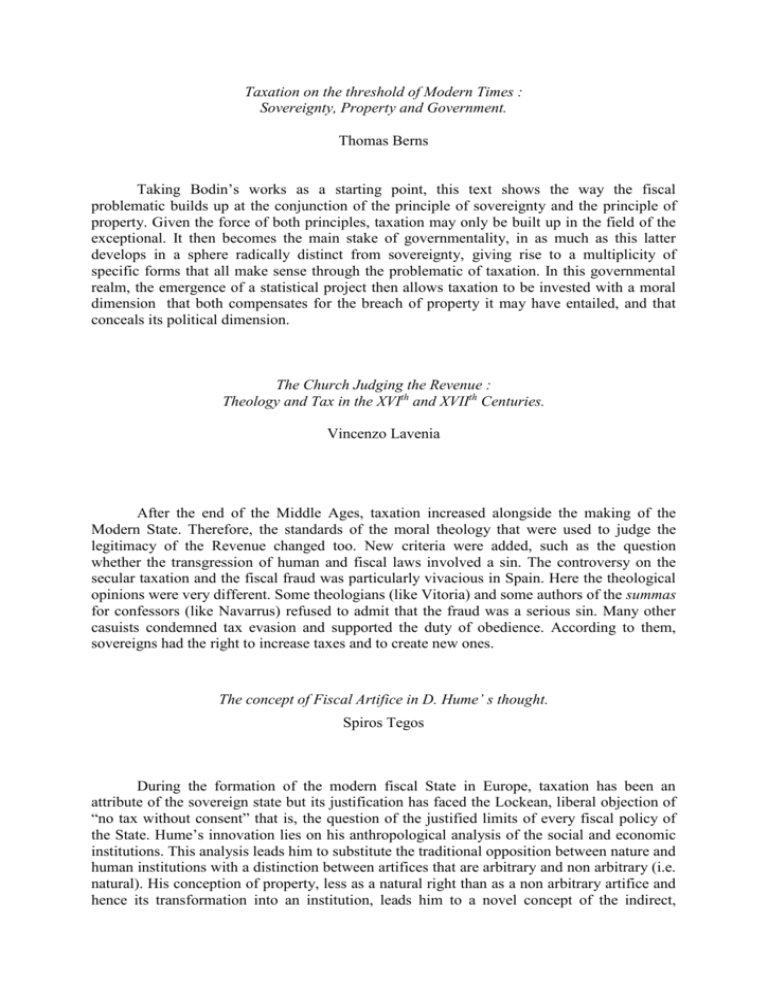
Taxation on the threshold of Modern Times : Sovereignty, Property and Government. Thomas Berns Taking Bodin’s works as a starting point, this text shows the way the fiscal problematic builds up at the conjunction of the principle of sovereignty and the principle of property. Given the force of both principles, taxation may only be built up in the field of the exceptional. It then becomes the main stake of governmentality, in as much as this latter develops in a sphere radically distinct from sovereignty, giving rise to a multiplicity of specific forms that all make sense through the problematic of taxation. In this governmental realm, the emergence of a statistical project then allows taxation to be invested with a moral dimension that both compensates for the breach of property it may have entailed, and that conceals its political dimension. The Church Judging the Revenue : Theology and Tax in the XVIth and XVIIth Centuries. Vincenzo Lavenia After the end of the Middle Ages, taxation increased alongside the making of the Modern State. Therefore, the standards of the moral theology that were used to judge the legitimacy of the Revenue changed too. New criteria were added, such as the question whether the transgression of human and fiscal laws involved a sin. The controversy on the secular taxation and the fiscal fraud was particularly vivacious in Spain. Here the theological opinions were very different. Some theologians (like Vitoria) and some authors of the summas for confessors (like Navarrus) refused to admit that the fraud was a serious sin. Many other casuists condemned tax evasion and supported the duty of obedience. According to them, sovereigns had the right to increase taxes and to create new ones. The concept of Fiscal Artifice in D. Hume’ s thought. Spiros Tegos During the formation of the modern fiscal State in Europe, taxation has been an attribute of the sovereign state but its justification has faced the Lockean, liberal objection of “no tax without consent” that is, the question of the justified limits of every fiscal policy of the State. Hume’s innovation lies on his anthropological analysis of the social and economic institutions. This analysis leads him to substitute the traditional opposition between nature and human institutions with a distinction between artifices that are arbitrary and non arbitrary (i.e. natural). His conception of property, less as a natural right than as a non arbitrary artifice and hence its transformation into an institution, leads him to a novel concept of the indirect, moderate tax as ordinary, justified income of the fiscal State. Therefore, the justification of fiscal policy becomes a matter of contrivance of new non arbitrary fiscal artifices that transform the extraordinary taxes into an ordinary, self-moderating fiscal institution. Is the principle of Fiscal Equality a Republican Invention ? Catherine Larrère To the principle of fiscal equality, we generally associate the idea of a personal tax, that everybody should pay, each according to one’s own means. Such a model appeared during the Ancien Régime, in response to the inconveniencies of its fiscal system. The French Revolution generalized and applied this model. Reading Montesquieu’s contribution to the reflexion on taxation, in the Spirit of Laws, one is led to put into question such received ideas. Because he focuses not on equality but on liberty, Montesquieu raises new questions : we are led to wonder how the personal taxation, which was a mark of servitude, became a sign of liberty, and whether taxes on merchandises would not have been more favorable to liberty. Fiscal equality, as we usually think of it, becomes a republican invention. And one can doubt what is really behind such an invention : equality or liberty ? From “Social Quietness” into Rule of Law: The “Proportionality” of Tax (1815-1920). Jean-Claude K. Dupont “Proportionality” of tax is the Gordian knot of issues concerning a legitimate action of the State (that is what taxation is, after all) and concerning the protection of private interests (e.g. from over-taxation). Focusing on fiscal debates in France and Germany, we point out that they carry an ever more deepened sense of “proportionality” (far from its strict technical sense). From a general and informal idea of some limits to the State’s action into a determined principle of proportionality involving a precise and sophisticated monitoring of it, the evolution of “proportionality” tends to lend weight to the hypothesis of a deep change in the nature of ties in a “civil union”. Giving up the model of only hierarchical ties, we may assist to the rise of some “coordination” (i.e. a legal-based relationship) between State and citizens. Legal Definition of Taxation. The case of French Doctrine. Emmanuel de Crouy-Chanel The definition of tax is a question seldom raised by the French lawyers. The constitutional notion of « impositions of all kinds » (impositions de toutes natures) is a wider one, that neither the constitutional judge nor the tax judge, for a better protection of citizens, wish or need to define more precisely. Tax law professors are still living on the legacy of Gaston Jèze who, between 1909 and 1930, built up a descriptive definition of the tax which may be of use for the science of finances he intended to create in France. This definition, purpose-oriented, sometimes distorted, needs to be reassessed on a purely juridical basis. A working definition is proposed, defining tax as a non-criminal, pecuniary debt, which doesn’t have any other cause than the sovereign’s will. Neoliberal Social Contract, Taxation Theory and Concerns about Decline. Emmanuel Picavet This article is a study of the contractarian pattern in neoliberal political and politicoeconomic thought, in connection with the theme of the decline of the liberal democratic State. It should be remarked that the economic approach of the democratic State has been enriched by the renewal of contractarian political philosophy and by the positive analyses of the functioning of democratic procedures. J. Buchanan and others have linked up the contractarian approach with an analysis of public goods. These goods are of primary interest for a theory of the use and misuse of public spending, which leads to a philosophy of rules and flexibility, with the prospect of a civic religion revolving around constitutional rules. The article investigates the reasons why, in such a setting, taxation theory belongs both to a normative theory of the goals of State action and to a positive theory of the resistance (or instability) of liberal society when it faces its own tensions. Transformation of economic Value, of its Appropriation and of Taxation. Yann Moulier Boutang Taxation relies upon economic wealth. The transformation of capitalism (the raising importance of knowledge based-economy) has deeply modified the principles of political economy and explains the present fiscal crisis of the State. This article reviews the main transformations of political economy, including the raising importance of externalities. It presents a general frame of the economy with externalities and draws some conclusions for the principles of taxation. Tax ought to charge the economic value which springs now mostly from circulation and from intangibles goods, hence every financial transaction. Philosophy of Taxation for the Third Millenium. Philippe Van Parijs The generalization of capitalism makes the tax-system more necessary than ever. The globalization of capitalism weakens it more than ever. One cannot understand what the taxsystem may and should be in this Third Millenium without first perceiving both of these statements. A coherent set of strategies is needed in order to face the challenge that this conjunction embodies. Among these, the relegitimation of tax and the relegitimation of patriotism, including at the European level.

